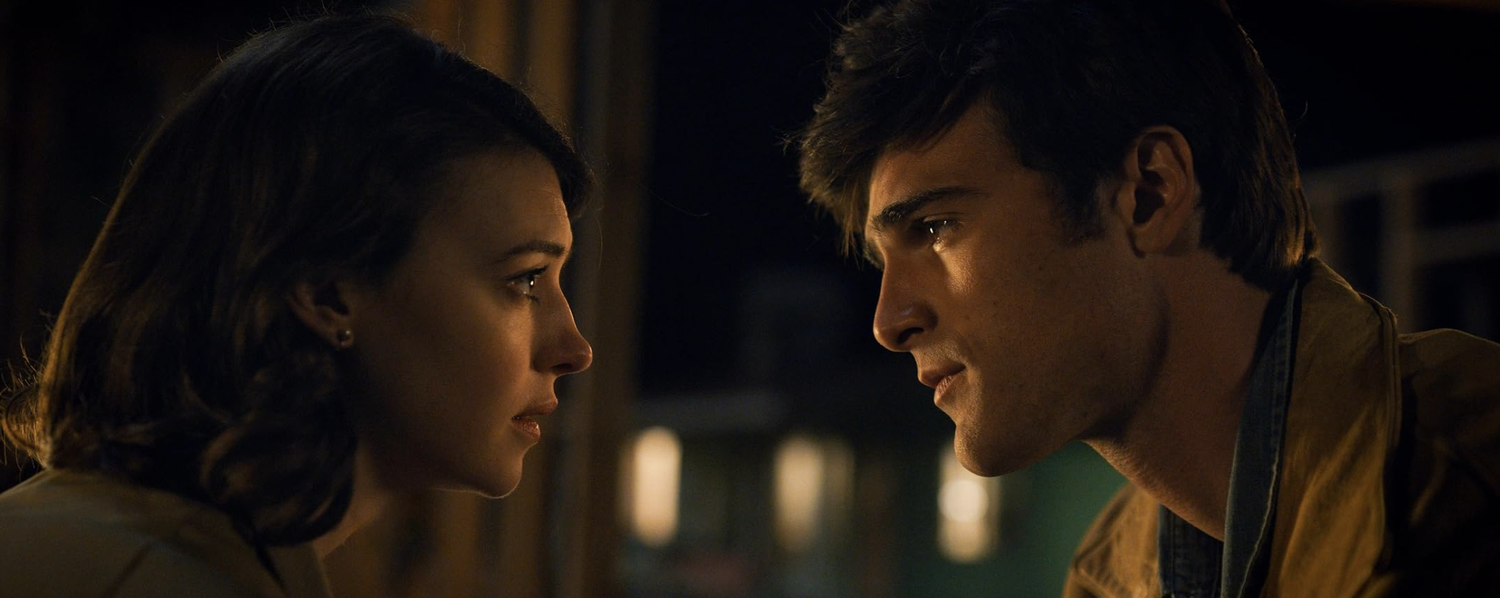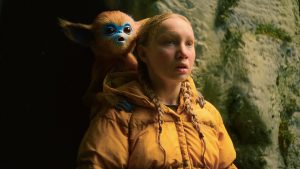Image courtesy of Sony Pictures Classics
ON SWIFT HORSES– 2 STARS
LESSON #1: THE DRAW OF SECRET ROMANTIC RELATIONSHIPS– The notion of secret romantic relationships carries an unmistakable intrigue in movies like On Swift Horses, on a few conditions. The pairings created need to have strong levels of chemistry and swoon. For chemistry, a viewer needs to look at the illicit union and undeniably see the temptation or attraction, especially versus what stands as the supposedly lesser alternative. For swoon, the couple must go through experiences and situations that create an arresting bond of intimacy. If they don’t flutter and fluster, neither do we.
Their very existence of a secret romantic relationship counts as a plot twist, no matter when it’s introduced in the film. Moreover, witnessing or being privy to scandalous details or private moments tends to create strong dramatic irony. That’s a powerful draw for audiences who will gladly scoot to the edge of their seat to see how it all turns out before the credits roll.
Normally, one confidential love affair is all a movie needs to emphasize and feature to get that desired effect. Based on Shannon Pufahl’s 2019 page-turner, On Swift Horses dangles as many as four. While promiscuity or parallel threads do not have to be frowned upon from a movie standpoint, four dangling possibilities prove too many for veteran television director Daniel Minahan stepping up to feature films.
On Swift Horses branches to follow the disenchanted and discouraged romantic journeys of two newly connected people in the 1950s. Muriel, played by Fresh and Twisters actress Daisy Edgar-Jones, becomes a newlywed to Will Poulter’s Lee, a Korean War veteran trying to enter the workforce and earn his successful and comfortable American Dream. He plans to relocate from Kansas to San Diego, where new expanses of homes are being built in Mission Valley. From the opening scene of vanilla bedroom heat and the woman sneaking cigarettes hidden in a Tampax box in the bathroom medicine cabinet, one can quickly tell this dream is not entirely a shared one.
LESSON #2: HIS WANTS VERSUS HERS– Since this era of the Baby Boomers, Muriel’s influence over Lee as a spouse of the fairer sex is virtually nonexistent. Back then, a wife was expected to go along with and support her husband’s dreams. Lo and behold, that’s not Muriel’s default makeup. She is the daughter of a fiercely independent woman who earned her own well-appointed country house, one that was bequeathed to Muriel upon her death, yet she does not get to be independent herself. To Lee and summed up by the awful line of “someone needs to tell that sad girl what to do,” Muriel’s generational inheritance is merely seen as the seed money for future California digs.
Enter Lee’s younger brother Julius, played by the Saltburn and Priscilla heartthrob Jacob Elordi. As soon as he introduces himself to Muriel, shirtless and lying across the curvaceous hood of a pickup truck, the On Swift Horses thermostat goes up a few degrees as a tinge of thirst brews within Muriel. Julius is earmarked by Lee to be the third participant in the San Diego plan. Unfortunately, he arrives with failed employment prospects and a cancelled military pension. Not wanting to be a further burden or unrequited third wheel, Julius bolts to Las Vegas to try his hand at gambling while the married duo leave Kansas for San Diego. In these parallel new settings—two that are more progressive, even in the 50s, to Kansas—On Swift Horses widens its curtain and its gaze to those aforementioned private trysts.
We learn Julius is a closeted gay male, meaning his extracurricular activities occur in less-than-pretty places. After sizing up his chops for cheating at poker and blackjack to not be good enough to beat the house (represented by Don Swayze’s leg-breaking casino owner), he takes a job as a spotter with security, assigned to watching customers through two-way mirrors in the hot rafters above the game floor’s ceilings. On the spotter job, he meets the vibrant Mexican immigrant Henry, played by Babylon discovery Diego Calva. He pitches partnering with Julius to use their learned skills to score at other casinos. They seal their partnership with more than a handshake and become inseparable.
Meanwhile in San Diego, Muriel uses her enterprising merit and moxie while working as a diner waitress to glean horse racing tips from some regulars. Sneaking to the track with her own money, she keeps hitting winners and stashing her thousands of dollars of winnings away from her husband. When she and Lee finally do get that Mission Valley ranch house using some of that money masked as the sale of her Kansas house, Muriel catches the interested eye of Sandra (Sasha Calle of The Flash), her lesbian neighbor, and Gail (The Deuce’s Kat Cunning), a fellow rich and lonely wife who frequents a notable gay sanctuary hotel in San Diego.
LESSON #3: ACTING ON URGES OR ACTING ON LOVE– As Julius and Muriel explore their urges, On Swift Horses tests these forbidden relationships. The movie is rife with hot and bothered flirtatious intrigue, giving intimacy coordinator Kelley Flynn quite the behind-the-scenes workload with the cast. The key characters are indulging their wants against community norms and, in Muriel’s case, the institution of marriage with a decent man. Even with his self-centered goals, Lee is never domineering, keeping him from becoming a true villain for the film. If anything, he knows his brother’s truth, giving him more sympathy than ambivalence about love versus the rigid public homophobia elsewhere. Maybe On Swift Horses needed a human proxy in that regard.
LESSON #4: MISMATCHED PASSIONS– All of this period-accurate taboo melodrama in On Swift Horses happens side-by-side to the risks of gambling as a narrative foil. That blending is haphazard, both emotionally and artistically. Lines of dialogue presenting conundrums and double-meaning aphorisms like “We’re all owned by something or someone,” “Come see us when your luck runs out,” or “We’re all just a hair’s breadth from losing everything” land with thuds more than heart punches. If anything, the greedy hustle arcs of the plot trying to be inclusions of invigoration distract and take away from the deeper opportunity for swoon. A tell-tale sign is when composer Mark Orton’s score shifts tones from to an entirely different genre of style when money is the focus over love in those given scenes. In any case, the gain or loss of a few bucks pales in comparison to the exposed souls hanging in the balance with matters of the heart.
Because of the shifting emphasis and mismatched soulful comparisons, whether any of these affairs ascend higher than a fling to a level of true love becomes a question with weak resolutions. It’s a shame too, because the potential for sweep was there for On Swift Horses. Of the aforementioned quartet of secret romances, the one, far and away, with the most passion and performative courage to shatter stereotypes is Julius and Henry’s. Diego Calva represents a wild, uninhibited spark and Jacob Elordi burns bright to match it. What they find is the closest to those necessary conditions of chemistry and swoon. The hard part is they are also the source of those tangential chases for money.
While Daisy Edgar-Jones commands the leading role of the film and learns the most about herself through this year-long chapter of life, her romances are diluted somewhat by the plainness of marital domesticity. We never feel the same intoxicating permanence with her suitors that we do with Elordi and Calva. Even so, the topical boundaries being broken in this setting should be serious and damn-near gut-wrenching. Minahan and company fall short of that. On Swift Horses has an ending coda of sorts that attempts to merge Julius and Muriel’s plights by calling back to an anonymous bulletin board of period-era photos seen in the opening credits. The effort is there for a larger and revelatory stump statement, but it falls too little, too late, and too lost.
LOGO DESIGNED BY MEENTS ILLUSTRATED (#1300)



